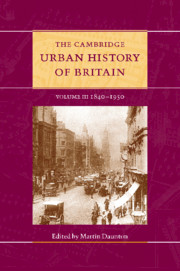Book contents
- Frontmatter
- 1 Introduction
- Part I Circulation
- Part II Governance
- 9 Central goverment and the towns
- 10 The changing functions of urban government: councillors, officials and pressure groups
- 11 The political economy of urban utilities
- 12 The provision of social services
- 13 Structure, culture and society in British towns
- Part III Construction
- Part IV Getting and spending
- Part V Images
- Select bibliography
- Index
- Plates 1-7
- Plates 8-14
- Plates 15-20
- Plates 21-27
- Plates 28-34
- Plates 35-41
- Plates 42-48>
- Plates 49-53
- References
10 - The changing functions of urban government: councillors, officials and pressure groups
from Part II - Governance
Published online by Cambridge University Press: 28 March 2008
- Frontmatter
- 1 Introduction
- Part I Circulation
- Part II Governance
- 9 Central goverment and the towns
- 10 The changing functions of urban government: councillors, officials and pressure groups
- 11 The political economy of urban utilities
- 12 The provision of social services
- 13 Structure, culture and society in British towns
- Part III Construction
- Part IV Getting and spending
- Part V Images
- Select bibliography
- Index
- Plates 1-7
- Plates 8-14
- Plates 15-20
- Plates 21-27
- Plates 28-34
- Plates 35-41
- Plates 42-48>
- Plates 49-53
- References
Summary
Municipal Boundaries – legal, administrative and physical – have never been simple or fixed, shifting as the local and central polity responded to the changing economic, social and demographic imperatives of the developing urban form. Thus, between 1830 and 1950 urban governance in Britain was transformed from a system of locally initiated, semiprivate structures with very limited powers and scant state or democratic supervision, through an era of proliferating single purpose boards, to the powerful, unified and democratically elected bodies which reshaped the urban environment in the early twentieth century. In the course of this transformation, local government took on a bewildering array of powers; raised, borrowed and spent thousands of millions of pounds; and ultimately employed an army of almost 1 million workers. Furthermore, this revolution was almost entirely the result of local initiative, for whilst all local government powers had to be sanctioned by parliament, the central state imposed few obligations on the municipalities. In these circumstances service provision varied over time and place, with many similar authorities playing very different roles in terms of utility provision, sanitary improvement, slum clearance, housing, recreation facilities, poor relief benefits or hospital management. This patchiness is usually attributed to the inadequacies of local politicians who, despite the urgings of enlightened central bureaucrats or passionate local socialists, skimped on expenditure in order to ease the rates bill. However, this view has come under increasing scrutiny with revisionists emphasising how much, not how little, was done, given the unequal distribution of resources across the country and the often unhelpful and centralising tendencies of the national state.
Keywords
- Type
- Chapter
- Information
- The Cambridge Urban History of Britain , pp. 287 - 314Publisher: Cambridge University PressPrint publication year: 2001
References
- 1
- Cited by



